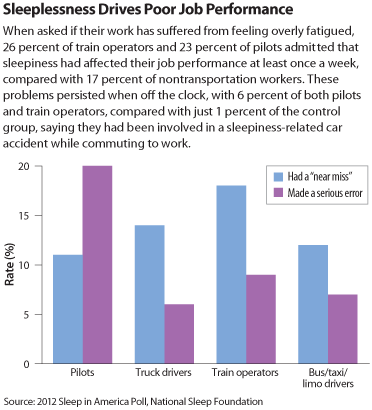Workers Admit Sleep Problems Have Led to Serious Errors
Abstract
Are the often-erratic work hours of transportation professionals to blame for a sleepiness that threatens the safety of their precious cargo? And how do such coping mechanisms as napping and caffeine consumption affect on-the-job performance of these individuals?
These are just a couple of the questions raised by the National Sleep Foundation’s (NSF) latest “Sleep in America” poll, which has been conducted annually since 1991. The 2012 poll is the first to focus specifically on the sleep habits of transportation workers and to compare them with the sleep habits of workers employed in other fields.

The survey, conducted on behalf of NSF by WB&A Market Research, questioned 1,087 adults over age 25, including 180 train operators, 202 pilots (of whom 64 percent fly commercial passenger planes), 203 truck drivers, and 210 bus, taxicab, and limousine drivers. Also completing online surveys this year was a 292-member control group of nontransportation workers.
The survey’s most worrisome finding is the number of transportation workers who said that being tired has caused safety problems at work, with 20 percent of pilots admitting they have made a “serious error” at work as a result of sleepiness and 18 percent of train operators citing a fatigue-related “near miss” (see chart).
In using survey answers to assess how respondents rate on the Epworth Sleepiness Scale, the poll found that 11 percent of pilots, train operators, and bus, taxi, and limo drivers were considered “sleepy,” compared with 7 percent of nontransportation workers. While these numbers failed to achieve statistical significance, it is noteworthy that 57 percent of train operators and 50 percent of pilots complained of rarely or never getting “a good night’s sleep,” compared with 42 percent of the control group of workers in other fields.
In attempting to cope with on-the-job sleepiness, transportation professionals rely on both naps and caffeine at greater rates than do those employed in other fields. More than one-half of pilots and train operators (58 percent and 56 percent, respectively) reported taking at least one nap on workdays, while only 27 percent of nontransportation workers indicating doing so.
And of those transportation workers indulging in workday naps, 50 percent of pilots, 42 percent of truck drivers, and 33 percent of train operators said they napped during work hours in the prior two weeks, compared with 19 percent of the control group.
Pilots and train operators also admitted to consuming significantly more caffeine than nontransportation workers to help stay awake and alert at work. Twenty percent of pilots and 12 percent of train operators said they consumed caffeine three or four times a week specifically to stave off sleepiness—only 5 percent of the control group acknowledged caffeine consumption for that reason.
So what’s to blame for the comparatively excessive sleepiness of transportation workers? The survey results suggested several contributing factors, with 44 percent of train operators and 37 percent of pilots saying their work schedules don’t allow enough time for sleep, a problem reported by 27 percent of nontransportation workers.
Pilots, truck drivers, and train operators all report working average shifts up to nearly two hours longer than nontransportation professionals, while only 6 percent of pilots and 47 percent of train operators (compared with 76 percent of the control group) said they work the same schedule every day.
Nontransportation workers also reported significantly more hours off between shifts than did transportation workers (14.2 hours vs. 12.2 hours), as well as shorter average commutes to and from work (46 minutes for pilots and 31 minutes for train operators, compared with 24 minutes for the control group). 
Complete results of NSF’s 2012 Sleep in America poll are posted at <www.sleepfoundation.org/2012poll>.



